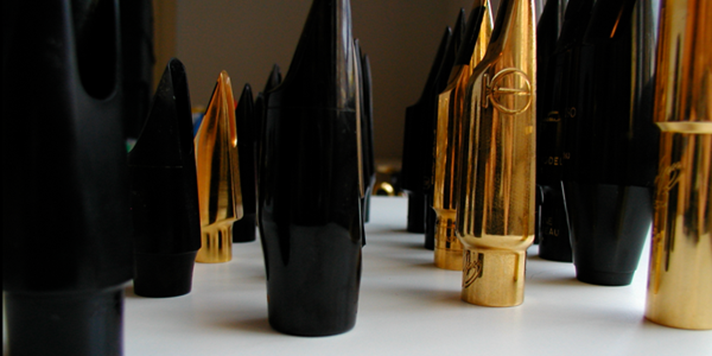So you’re looking for a new mouthpiece and you’ve found the process to be overwhelming. The selection is enormous and you just don’t know where to start. If this sounds like you, then you are in the right place. This article is here to help you simplify and de-stress (as opposed to distress) the mouthpiece purchasing experience.
There are a lot of things to consider when looking at a new mouthpiece – the tip opening, the tone chamber, the types of materials used to make the mouthpiece, the length of the lay, etc. – these are all important things to think about when choosing a mouthpiece.
To start, the material the mouthpiece is made of changes the personality and response of the mouthpiece greatly. Mouthpieces are generally made out of plastic, hard rubber or metal, but you can sometimes find wood mouthpieces. Here are a few examples of how the material changes the sound:
- Plastic mouthpieces tend to be the easiest to play or begin on because they are not very resistant.
- Hard rubber mouthpieces tend to promote the fundamental sound of the saxophone, with a little bit more resistance than the plastic mouthpiece.
- Metal mouthpieces create a kind of “laser tone” – the can enhance the power and volume of the instrument and also help achieve the overtone series.
The bore size of the mouthpiece also changes the response of your mouthpiece. Bore sizes are usually defined as small, medium and large. Small bore mouthpieces enhance the higher frequencies of the sax, giving the player a brighter sound. Small bore mouthpieces are best used playing lead over other saxophones or soloing over a large group. Medium bore mouthpieces creates a sound that more easily blends with an ensemble than a small bore, but still allows the player the volume to solo with a group. A large bore mouthpiece gives the saxophone a darker sound which is best for classical saxophone ensembles.
Although the design of the mouthpiece gives it its own characteristics, the most important part of mouthpiece selection is the player. No two saxophone players are exactly the same, so what works for one person might not work for you. Therefore, use what you are comfortable and happy with – don’t go get something because it is what someone else uses.
It also helps to bring someone along with you when you’re trying out mouthpieces. Another musician and/or your teacher can offer their thoughts on your sound and the quality of the mouthpiece and their input can be invaluable when making that kind of investment.
Some Popular Mouthpiece Companies:
- Beechler Mouthpieces
- Vandoren Mouthpieces
- Yanagisawa Mouthpieces
- Rousseau Mouthpieces
- Jody Jazz Mouthpieces
- Brancher Mouthpieces
- Guardala Mouthpieces
[template id=”182″]
